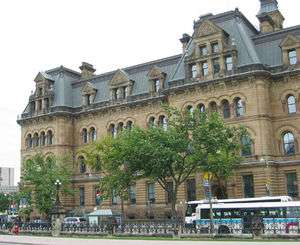Privy Council Office (Canada)

 |
| This article is part of a series on the politics and government of Canada |
| Government |
|
|
Related topics |
The Canadian Privy Council Office (French: Bureau du Conseil privé) is the secretariat of the federal cabinet, which is a committee of the Queen's Privy Council for Canada, and provides non-partisan advice and support to the Canadian ministry, as well as leadership, coordination, and support to the departments and agencies of government. It is located in the Langevin Block of the Parliament buildings.
Overview
Although the PCO has grown in size and complexity over the years, its main pillars remain the operations and plans secretariats. The former is primarily concerned with coordinating the day-to-day issues of government while the latter takes a medium-term view to the evolution of the Canadian federation. Each incoming Prime Minister will re-organize the PCO to suit the policy agenda of his government. Today, the PCO also includes a department of intergovernmental affairs, secretariats for communications, foreign and defence policy, security and intelligence, social affairs, economic affairs, legislation and house planning and machinery of government.
Traditionally, the PCO has served as a "finishing school" for civil servants destined for executive positions within government. Officials who spend several years gaining experience at the PCO, and working on policy matters from the perspective of the Prime Minister, return to their home departments with a greater appreciation of government operations at the corporate level. Aside from senior positions within the civil service, PCO alumni have gone on to pursue successful careers in business and politics, including Paul Tellier, former CEO of Bombardier; Michael Sabia, CEO of Bell Canada; Robert Rabinovitch, CEO of the Canadian Broadcasting Corporation; former Prime Minister Pierre Trudeau; and former Minister of Foreign Affairs Pierre Pettigrew.
The head of the civil service has the title of Clerk of the Privy Council, and also serves as the Secretary to the Cabinet and Deputy Minister to the Prime Minister.
The Privy Council Office's role is different from that of the Prime Minister's Office, which is a personal and partisan office. It is understood that the Prime Minister should not receive advice from only one institutionalized source. To that end, the PCO serves as the policy-oriented but politically-sensitive advisory unit to the Prime Minister, while the PMO is politically-oriented but policy-sensitive.
Current structure of the Privy Council Office
- Clerk of the Privy Council and Secretary to the Cabinet
- Deputy Secretary to the Cabinet, Plans and Consultations
- Assistant Secretary to the Cabinet, Priorities and Planning
- Assistant Secretary to the Cabinet, Communications and Consultations
- Assistant Secretary to the Cabinet, Federal-Provincial/Territorial Relations
- Assistant Secretary to the Cabinet, Liaison Secretariat for Macroeconomic Policy
- Deputy Secretary to the Cabinet, Operations
- Assistant Secretary to the Cabinet, Social Policy
- Assistant Secretary to the Cabinet, Economic and Regional Development Policy
- Assistant Secretary to the Cabinet, Operations
- Assistant Clerk of the Privy Council, Order-in-Council
- Director, Cabinet Papers System
- Deputy Secretary to the Cabinet, Legislation & Housing Planning, & Machinery of Government, Counsel to the Clerk of the Privy Council
- Assistant Secretary to the Cabinet, Legislation and House Planning
- Assistant Secretary to the Cabinet, Machinery of Government.
- Director of Legal Operations, Legal Operations/Counsel
- Director, Cabinet Confidences/Counsel
- Deputy Secretary to the Cabinet, Senior Personnel and Public Service Renewal
- Assistant Secretary to the Cabinet, Senior Personnel
- Assistant Secretary to the Cabinet, Public Service Renewal
- Assistant Deputy Minister, Corporate Services Branch
- Deputy Secretary to the Cabinet, Plans and Consultations
- National Security Advisor to the Prime Minister and Associate Secretary to the Cabinet
- Associate Deputy National Security Advisor to the Prime Minister and Deputy Secretary to the Cabinet
- Coordinator for the 2010 Olympics and G8 Security
- Foreign and Defense Policy Advisor to the Prime Minister and Deputy Secretary to the Cabinet
- Assistant Secretary to the Cabinet, Foreign and Defence Policy
- Assistant Secretary to the Cabinet, Security and Intelligence
- Executive Director, International Assessment Staff
- Deputy Minister of Intergovernmental Affairs
- Assistant Deputy Minister, Intergovernmental Operations
- Assistant Deputy Minister, Intergovernmental Policy and Planning
- Deputy Minister, Afghanistan Task Force